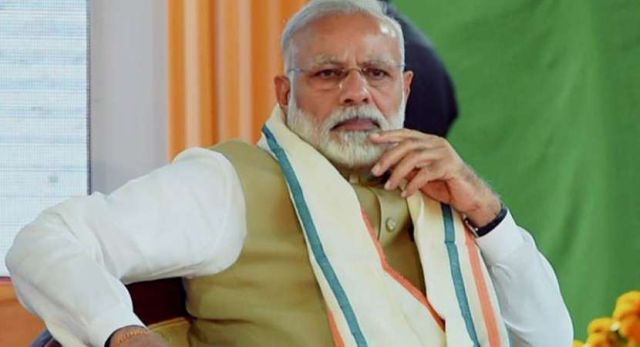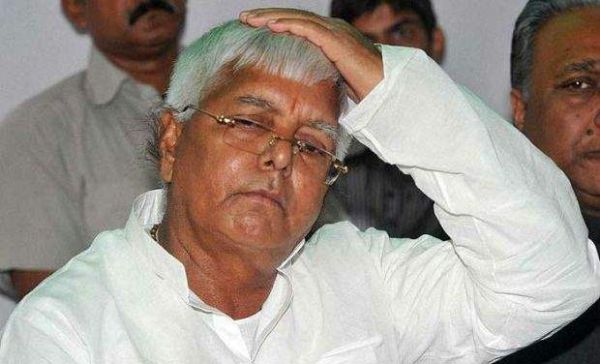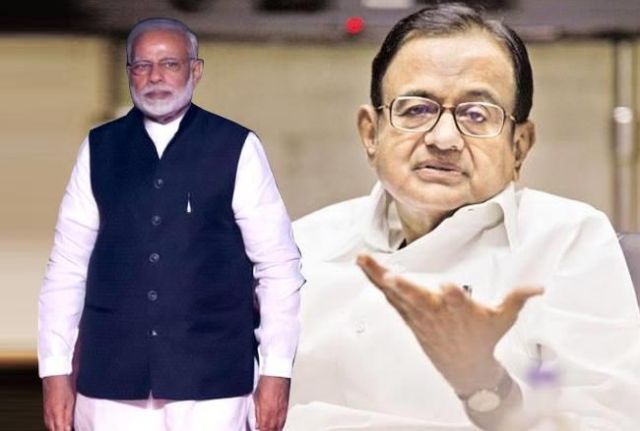
by admin | May 25, 2021 | News, Politics
 Chamarajanagar (Karnataka) : Prime Minister Narendra Modi on Tuesday lamented that all development in Karnataka has been “blocked” by the ruling Congress due to its obsession with family politics.
Chamarajanagar (Karnataka) : Prime Minister Narendra Modi on Tuesday lamented that all development in Karnataka has been “blocked” by the ruling Congress due to its obsession with family politics.
“Where there is Congress, all roads that lead to development are blocked. There is only family politics, corruption and lack of harmony,” Modi told a BJP rally in Santhemarahalli village, about 170 km south of Bengaluru.
Launching the Bharatiya Janata Party’s (BJP) election campaign in the district for the upcoming Assembly election, Modi addressed hundreds of people, including party cadres.
“We hear in Delhi that there is a BJP wave in Karnataka. But as I see it, it’s not just a wave but a storm,” thundered Modi.
The Prime Minister’s 40-minute speech in Hindi was simultaneously translated into Kannada, a first since his visits to the southern state over the past few months, so as to connect with the people in the local language.
Law and order in Karnataka has collapsed under Congress rule, Modi said.
“When the Lokayukta in the state is not safe, how can one expect the common people to be safe under the Congress government?”
Karnataka’s anti-graft ombudsman Justice P. Vishwanatha Shetty was stabbed at his office by a man in the state capital on March 7.
“For the Congress, it has always been about family politics. But for us (BJP), it is about people’s politics. People of the state will decide which kind of politics they will choose (in the upcoming election),” Modi said.
He appealed to the people to vote for politics of honesty.
“Let this vote strengthen our commitment to end corruption. This vote of yours will not just choose your MLA, but will decide the future of the state.
“(BJP’s Chief Ministerial candidate) B.S. Yeddyurappa is the hope for Karnataka and he will soon be chosen as the Chief Minister,” asserted Modi.
Modi will also address rallies on Tuesday in Udupi and Belagavi districts.
—IANS

by admin | May 25, 2021 | Opinions
 By Rajendra Shende,
By Rajendra Shende,
For the first time, the world is experiencing ice-breaking events that are not attributable to global warming. But they are definitely related to warming of another kind. There has been a sudden surge of warming of bilateral and one-to-one interactions among nations. Multilateralism is on the back-burner, at least for now. The United Nations is resigned to the position of a passive bystander. Regional groupings are curious ringside onlookers.
The Moon-Kim summit in the demilitarised border of South and North Korea, the Marcon-Trump bromance in the White House and the Modi-Xi riverside dialogue in Wuhan are cases in point.
All this warmth coming soon after the high tension between the US and China reminds us of what Otto von Bismarck, a former German Chancellor, once said: “Politics is the art of the possible, the attainable — the art of the next best.” That was at the end of 19th century. Now, in the 21st century, not only are smart technologies disrupting the way the world lives but even the new-found smart diplomacy is disrupting the way resolutions are sought for long-standing conflicts.
The neoteric approaches, “start-ups” in terms of today’s technology, espoused by these leaders, almost instinctively, are setting the agenda of “no-agenda talks” and communicating with “no-communique methods”.
The last such out-of-box diplomacy of recent times was seen almost 35 years back. In 1971, the so-called “ping-pong-diplomacy” triggered by table tennis players from the US was seized by Chairman Mao and responded to by Henry Kissinger, the US Secretary of State — and gave both countries the confidence to thaw their icy relations. The initial moves were shrouded in secrecy and intrigue. In July 1971, Kissinger faked “illness” to avoid the paparazzi closely following him while on a visit to Pakistan and did not appear in public for a day. He was actually on a top-secret mission to Beijing to negotiate with Prime Minister Zhou Enlai about a visit by President Nixon to China, which eventually did take place soon after.
The subsequent “shuttle-diplomacy” for the Palestine-Israel peace deal by Kissinger was effective to a certain extent. The final peace deal was clinched, however, through intimate bilateral interaction facilitated by the passive but positive role by Norway.
The informal dialogue with the “Chai-Diplomacy” between Prime Minister Narendra Modi and President Xi Jinping on the banks of the Yangtze river in Wuhan last week was indeed a unique event in more senses than one.
Firstly, it was initiated by China after an eyeball-to-eyeball military stand-off between the second and third largest economies of the world. Second, the two leaders spent more quality time together than scheduled — for two days, away from their capitals, without aides who often display classical hawkish diplomacy — to give a strong, positive message to the world.
That meeting also pointed to a new hope for a positive and constructive approach in facilitating solutions for global challenges, including climate change, sustainable development, food security, combating diseases, natural disasters and cyber security. The responsive cooperation “to pull together their expertise and resources in these areas and create a global network dedicated to these challenges for the larger benefit of humanity” was the surprise message from the leaders of two giants that were logjammed just 10 months back.
South Korean President Moon Jae-in and North Korean leader Kim Jong-un’s diplomatic overture, almost coinciding with the Modi-Xi informal summit, has reversed the nuclear crisis on the Korean peninsula from brinkmanship towards diplomacy. From threatening nuclear missiles to the hopes of peace missions was a warm and welcoming transition.
Starting with joint winter Olympic Games participation by the two Koreas, both Kim and Moon have taken bilateral diplomatic gamble. The “Olympic diplomacy” has worked so far and it is anybody’s guess how Kim will play when it comes to specifics in implementing the “complete denuclearisation” of the peninsula.
But the body language and humour of the two leaders during the crossing of the 38th parallel that divides North and South Korea were a clear indication that the future now will be driven by bilateral interests in an “amicable atmosphere overflowing with feelings of blood relatives”, as stated in their joint statement.
The world also witnessed, again at around the same time, another scene of witty and comic body language of yet another duo. The media called it “dandruff diplomacy”. Emmanuel Macron, French President, and Donald Trump, US President, almost displayed disruptive diplomacy. Trump’s trait of firing anyone who disagrees with him, was seen to turn into a language of “love thy disagreement”.
He jokingly brushed dandruff off Macron’s suit, in front of reporters, but it showed Trump’s appreciation of Macron’s steadfast and positive criticism — and probably suggested a willingness to listen. A definite disruption in Trumpian tactics.
On trade-tariffs, the Iran nuclear deal, the Paris Climate Agreement, Macron has definite and strong disagreements with Trump. By inviting Marcon, to address the joint meeting of the Congress, Trump was taking the risk of allowing a foreign leader to openly disagree on the floor of the highest political chamber of his country. But that showed the selective open-minded dimension of his diplomacy.
Modi-Xi, Kim-Moon and Macron-Trump have given strong messages through their distinctive diplomacy. First, that neighbours can resolve their conflicts bilaterally. Second, that global threats like terrorism, climate change and nuclearisation have to be addressed through open dialogue and disruptive diplomacy. Third, leader-to-leader informal contacts have the power to resolve conflicts. Lastly, in a rapidly changing century of degradation of ecosystems, global dialogue also needs bilateral initiatives.
(Rajendra Shende is Chairman, TERRE Policy Centre, a former UNEP Director and IIT Alumnus. The views expressed are personal. He can be contacted at shende.rajendra@gmail.com)
—IANS

by admin | May 25, 2021 | News, Politics
 New Delhi : Convicted RJD chief Lalu Prasad on Monday blamed Prime Minister Narendra Modi after he was told to leave AIIMS where he was being treated to return to Ranchi, shortly after Congress President Rahul Gandhi called on the former Bihar Chief Minister.
New Delhi : Convicted RJD chief Lalu Prasad on Monday blamed Prime Minister Narendra Modi after he was told to leave AIIMS where he was being treated to return to Ranchi, shortly after Congress President Rahul Gandhi called on the former Bihar Chief Minister.
“It (shifting from AIIMS to Ranchi hospital) is under the pressure from the Centre, from Narendra Modi that I am being sent back there. It is entirely due to political rivalry,” Lalu Prasad told reporters as he came out of AIIMS on a wheelchair after being discharged.
The RJD leader said shifting him back to the Rajendra Institute of Medical Science (RIMS) in Ranchi was a conspiracy so that his health would deteriorate further. “I am being shifted to a place where there are no facilities. It is a tough time, but I will face it.”
But AIIMS spokesperson B.N. Acharya said the decision followed the recommendation of a medical board set up for his treatment which found significant improvement in his health and that “he was discharged on Saturday” itself.
Saying Lalu Prasad was currently stable and fit to travel, Acharya said in a statement: “The medical board met on April 28, reviewed his progress and decided that he was fit to be discharged. However, due to his chronic problem of hypertension, diabetes and backache he was advised to be on regular follow up and management at RIMS Ranchi. He was therefore discharged on Saturday. However he requested to be kept in hospital as he wanted to travel on Monday.”
Some supporters of the RJD leader, annoyed over his “sudden discharge”, allegedly misbehaved with the hospital staff and even damaged the glass door of Cath Lab, resulting in injury to a security guard. AIIMS asked police to lodge an FIR.
Earlier, Rahul Gandhi called on Lalu Prasad at AIIMS and had a half hour meeting with him.
Lalu Prasad, who was admitted to AIIMS on March 29 for treatment of heart and kidney related ailments, wrote in a letter to AIIMS Director Randeep Guleria: “If I am sent from AIIMS to Ranchi medical college, in case of any danger to my life, sole responsibility will be on you all.
“Doctors are a reflection of god. They should not take any decision under pressure from any individual or political party. Their first duty is towards complete recovery of the patient’s health. Till the time I am fully healthy, I should be kept here for treatment,” he added.
The RJD leader said he had backache, frequent dizziness and had fallen in the bathroom several times.
However, the hospital in a detailed statement said: “Lalu Prasad was referred from RIMS Ranchi with peri anal abcess, high blood sugar and infection. AIIMS constituted a medical board consisting of senior faculty members from department of medicine, surgery, cardiology, endocrinology and nephrology for his care.
“He was put on injectable antibiotics and then on oral antibiotics. His blood sugar was controlled and evaluation for cardiac and renal status was also done. He showed significant improvement. He had no fever and his antibiotics were stopped.”
Lalu Prasad was admitted to RIMS in Ranchi on March 17 following complaints of uneasiness when he was lodged at the Birsa Munda Jail where he is serving a jail term since December 23, 2017 in connection with the fodder scam.
He has been convicted in four fodder scam cases since 2013 — the latest being the Dumka treasury case in which a special CBI court sentenced him to 14 years in jail.
—IANS

by admin | May 25, 2021 | Employment, News, Politics
 New Delhi : Congress leader and former Finance Minister P. Chidambaram said on Monday that the biggest issue in the 2019 Lok Sabha election will be unemployment and Narendra Modi government’s “incompetence to create jobs”.
New Delhi : Congress leader and former Finance Minister P. Chidambaram said on Monday that the biggest issue in the 2019 Lok Sabha election will be unemployment and Narendra Modi government’s “incompetence to create jobs”.
Addressing the national executive meeting of the Indian Youth Congress here, Chidambaram said the Modi government did not know how to create jobs.
“There will be many issues but the biggest issue of 2019 election will be unemployment. The government is so incompetent that they don’t know how to create jobs,” he said.
There were vacancies across sectors and thousands of jobs could be further created, he said.
Citing instances, Chidambaram said there was just one teacher in one lakh government schools. “If at least five teachers are recruited in these one-teacher schools, millions of jobs will be created.”
He said there were vacancies of doctors, clerks, peons and safai karamcharis in various departments.
The former Minister said nearly 6,000 teaching posts were vacant in central universities, while in the higher judiciary 410 posts of judges were vacant.
He said if the Congress came to power, it would focus on creating jobs in MSMEs (micro, small and medium enterprises), besides paying attention to exports and off-farm jobs, such as poultry, food processing and diary farming.
“We will not do anything that this government is doing,” he said.
Chidambaram said there was “massive open unemployment” in the country and “jobs can be created when there is demand for more goods and services”.
“More goods and services will be produced with more investments which will come when there is a climate friendly to investment,” he said.
The Congress leader said investment had gone down drastically in the last four years. “Tragedy for India is that investment ratio at this stage is lowest since liberalisation.”
He said sectors such as IT, which were booming in the past, had also shed jobs.
Slamming the Modi government, he said demonetisation and faulty implementation of Goods and Services Tax had destroyed jobs in the MSME sector.
Chdiambaram also referred to the BJP leaders claiming credit for about 100 per cent electrification of villages as “another jumla”.
He said electrification of a vast majority of villages was done during Congress governments and the BJP-led government had completed electrification of only over 18,000 villages which were pending.
—IANS

by admin | May 25, 2021 | Commodities, Commodities News, Economy, Entrepreneurship, News, Politics, Success Stories, Your Business Plan
 New Delhi : Prime Minister Narendra Modi on Sunday appreciated the farmers of Uttarakhand’s Bageshwar district for making biscuits from their farm produce.
New Delhi : Prime Minister Narendra Modi on Sunday appreciated the farmers of Uttarakhand’s Bageshwar district for making biscuits from their farm produce.
“In Bageshwar, the main crops are mandwa, chaulai, corn or barley. This being a hilly area, the farmers did not get a fair price for their produce.
“But the farmers in Kapkot village decided to come out of this situation. They adopted a value addition process and turned a loss-incurring equation into a profit-earning one,” the Prime Minister said in his monthly radio programme “Mann Ki Baat”.
Modi said he learned about the success story of these farmers from “Good News India” programme on Doordarshan.
He said their income doubled with the price of grain going up to Rs 50 per kg from Rs 25 per kg.
“With the hard work of these farmers, the annual turnover of the society has gone up from Rs 10 lakh to Rs 15 lakh and with more than 900 families getting employment here, people have stopped migrating to other places.”
“Impressed by the bold initiative of these farmers, the administration has linked this to the National Livelihood Mission,” he said, adding that these biscuits were now being supplied to Almora and Kausani besides being sold at about 50 Aanganwadi centres in the district.
—IANS

 Chamarajanagar (Karnataka) : Prime Minister Narendra Modi on Tuesday lamented that all development in Karnataka has been “blocked” by the ruling Congress due to its obsession with family politics.
Chamarajanagar (Karnataka) : Prime Minister Narendra Modi on Tuesday lamented that all development in Karnataka has been “blocked” by the ruling Congress due to its obsession with family politics.


